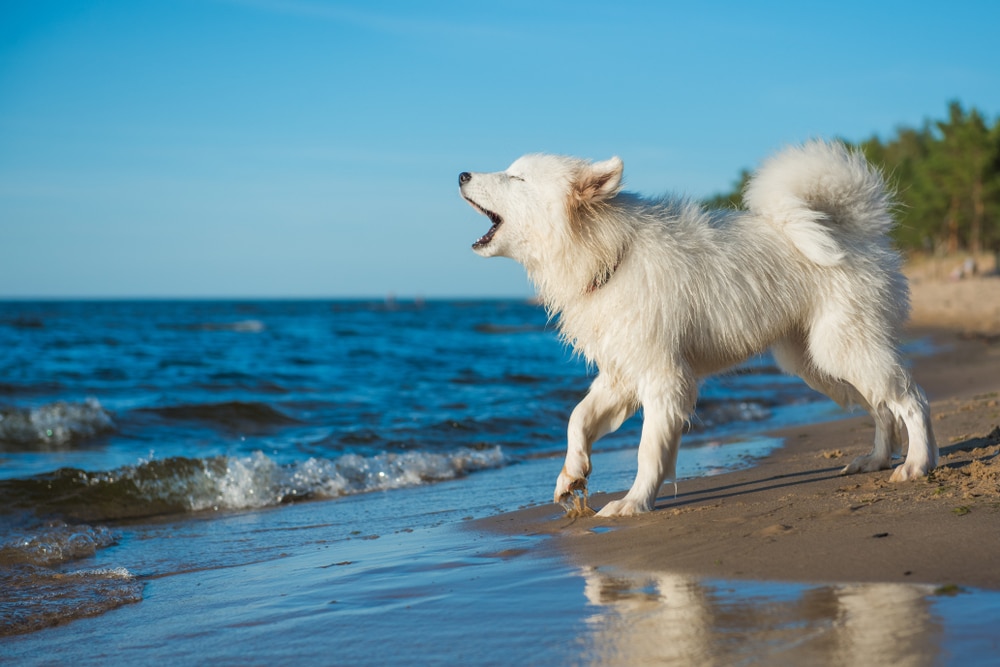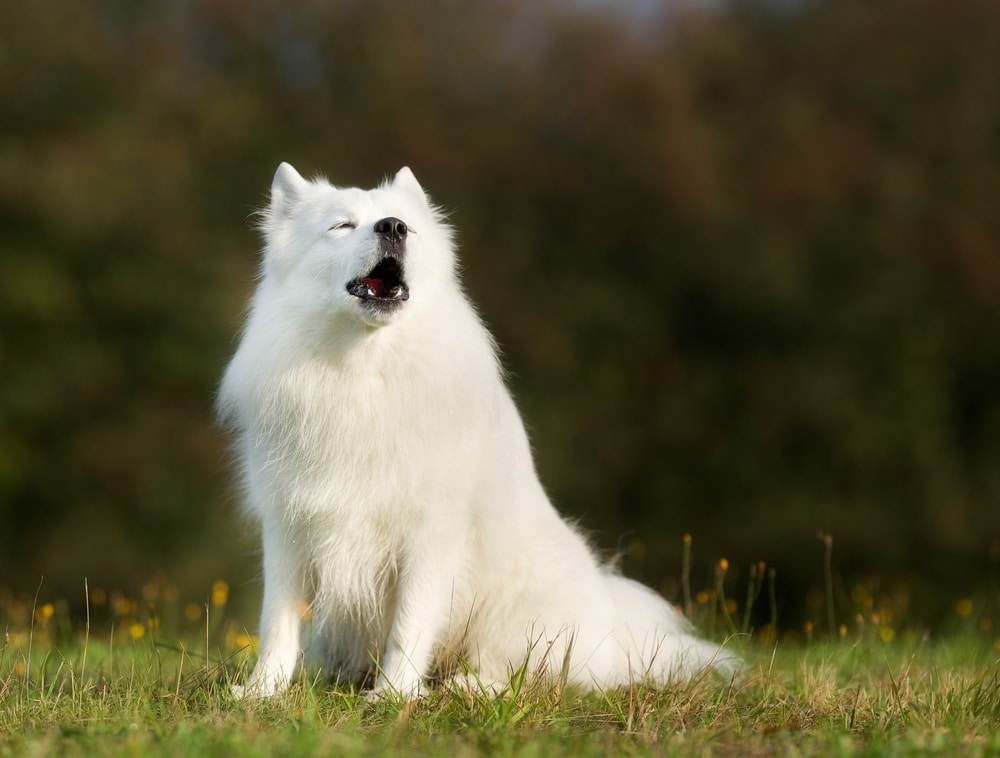Do you ever wish you knew more about why your dog howls? Maybe it’s trying to wake up its inner wolf, for example? There are many answers to the question, “Why do dogs howl?” So, what are they?
Howling is a way of communication in dogs. Since humans satisfy dogs’ needs, some dogs will live their whole life without howling. However, don’t be surprised if your dog howls on a daily basis; it is coming from their wolf ancestors.
Table of Contents
What Is Howling?

Canines communicate with other canines and people by using a variety of vocalizations, body positions, and movements like tail wagging. Like growling or barking, howling is a typical vocalization used by dogs.
Most canines, especially wolves, coyotes, foxes, and dogs, as well as cats and several species of monkeys, also use howling as a vocal form of communication. Howls are typically prolonged sustained sounds that are loud and can be heard from great distances. They frequently have considerable pitch changes.
Howling is instinctive and might be an underlying issue or natural occurrence. Some canines howl in response to loud noises like sirens or musical instruments, but excessive howling can indicate an underlying problem.
Why Do Dogs Howl: The 6 Types Of Howling And What They’re Communicating
While the majority of causes of why dogs howl aren’t harmful, your dog’s howls may not all be harmless and may instead indicate a more serious problem. These problems are medical issues, separation anxiety, or danger near you.
The Dog Is Reacting To A Sound
Many dogs may howl when they are excited by loud noises like sirens, alarms, and even music. These reactions to loud noises are instinctive reflexes from the past. In the wild, wolves communicate with one another through howling.
Therefore, your dog is trying to communicate by howling that they have heard the sound and are prepared to react. Usually, the dog starts being loud when it hears the trigger sound and stops when the sound stops. Even though it might be inconvenient, it typically isn’t a cause for alarm.
The Dog Is Alerting You To Danger
The dog may also howl to warn you about something they believe to be dangerous.
For instance, your furry friend may bark or howl at passing strangers. It is doing that to warn potential invaders that they are not welcome on its property because it is attempting to defend it.
The Dog Is Acknowledging Other Dogs
Dogs are descended from wolves, and howling is a characteristic of wolves in the wild, just like many other canine activities. Howling is mostly used to communicate with other canines, as it is done between the wolves in a pack.
Your dog is intended to send a long-distance message to an audience because a howl’s intensity is meant to be heard across a greater distance.
The Dog Wants Something
A howl immediately grabs a person’s attention, and in some situations, your dog may be after just that, the attention. Some dogs will try to manipulate people verbally into giving them what they wish. This could be a treat or a walk, for example.
Even though it could be challenging, the best method to handle this kind of attention-seeking is to avoid making eye contact with the dog. Only give it your full attention after it has stopped.
The Dog Has Separation Anxiety
When you are not around, your dog may howl to express its separation anxiety. Other signs of separation anxiety to watch out for include frequently having accidents in the house when you’re away from home or finding items ruined when you return.
Getting your pet frequent exercise is a way to assist in reducing their stress. Contact your vet to discuss how you can make your dog feel more at ease if separation anxiety is a problem.
The Dog Is In Pain
If your dog is normally calm but suddenly starts howling, it may be an attempt to communicate their discomfort. Check your dog for injuries if it is howling more frequently than normal, especially if it sounds urgent or is higher pitched. To rule out an underlying medical condition, you should also consider having a veterinarian examine your dog.
What Is The Reason For Puppy Howling?
Just as with adult dogs, puppies also howl. Puppies vocalize themselves for a variety of reasons, but many of them, sometimes including howls, are just seeking attention.
Be careful of your behavior in this stage of the puppy’s life. Dogs are quite intelligent and can quickly recall what exactly gets them what they want.
If you rewarded your dog in the past for producing loud noises, it will believe howling will get it more rewards. “Learned howling” is the name of this.
On the other hand, puppies are fragile and can show signs of physical pain or distress through howling, so you have to watch out for real concerns too.
Do Some Dog Breeds Howl More Than Others?
All dogs howl, from youngest to oldest, from small breeds and fluffy giants. How loud, how often, or how long depends on age, temperament, breed, and even individuals from the same breed.
With that in mind, some of the loudest and most prominent howls are the ones of the hound breeds. Due to their hunting instincts, hound breeds like beagles and Basset hounds enjoy vocalizing. Their loud voices signal to a hunter that they have captured their prey.
Siberian Huskies, Malamutes, and other sled dog hybrids howl frequently as well. The adventurous nature of these working dogs makes them curious about what is over the next hill. Since they frequently live in packs with other canines who share their interests, howling becomes a shared hobby.
How To Help Dogs That Excessively Howl?
There are various things you can take to address your dog’s howling. This can include lessening how often it happens if it feels out of control or is harming your quality of life (or your neighbors’).
Your best option is to take your dog to your veterinarian for a checkup to ensure they are physically healthy.
You can also work with a trainer to change the behavior if they are healthy and still howl. You can teach your puppy the “quiet” command or make a point to ignore its attention-seeking sounds. This method tells your dog that howling is ineffective in this way.
Anger and aggression, anxiety, phobias, and fear are frequently treated through desensitization and counterconditioning. It influences your dog’s thoughts or emotions in relation to a certain trigger. A certified applied animal behaviorist (CAAB) can find the right treatment for your dog if needed.
Because dogs can also suffer from separation anxiety and therefore lead to howling, give your dog lots of love and attention when you get home. Playing with them makes your relationship stronger and reduces their tension.
Final Thoughts: Why Do Dogs Howl?
As you can tell by now, there are many reasons as to why dogs howl. Now that we have presented all of them, it is up to you to make a judgment on how to treat this situation. We believe in you!
So, why do you think your dog is howling? Let us know your thoughts and why in the comments below!
